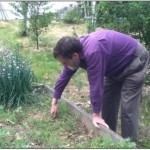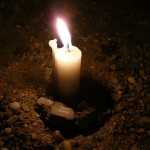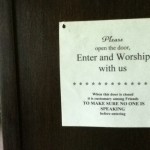Spiritual Identity and Membership Series:
Part 1: Quakerpagan or Paganquaker –
Part 2: Membership and Identity –
Part 3: Marshall Massey Replies
This began as a response to Cat’s most recent post, but has taken on a life of its own. I wrote it to address a fundamental dimension to this whole membership/self-identification question that no one—not Marshal nor Liz nor Cat—seemed to be addressing: namely the relationship with the Divine that is an integral part of any religious group, whether it be Pagan or Quaker, Christian or otherwise. I see now that this point did rise in responses to Cat’s post, but I still think it worth sharing my two cents.
When I applied for membership in Mount Toby Friends Meeting, my clearness committee asked me what I thought the word “membership” meant. I said it is something like how Catholics describe the sacrament of marriage: “an outward and visible sign of an inward and spiritual reality.” (“Your Christian roots are showing,” Cat tells me, reading over my shoulder.)
God (the Divine, the Gods…whatever you want to call Him/Her/It/Them) calls to us. Divinity “bleeds through” from the realm of the Divine into our world. Pagans invoke it loudly, Quakers listen for it quietly, both have to work at discernment but can usually recognize sooner or later when it whacks them upside the head. And both groups have formed enduring, vibrant communities centered on the experience of the Divine. Like all communities, Quakers and Pagans have social norms and expectations, and they each have their interplay between the group’s values and the values that individual members bring. But Pagans and Quakers also share direct input from Outside, and this changes EVERYTHING.
I applied for membership in Mount Toby the day after I spoke in meeting for the first time. I’d been attending for over a year, but I was really blown away by what a profound experience it was to speak in meeting. It’s inexpressible to anyone who hasn’t experienced something like it. There are words that describe it, but like other very profound feelings, the words are just prattle unless you’ve been there. I felt stretched by the message passing through me, and a little wobbly when I sat down again, and—this is the important part—I felt like when my spirit contracted again, back to its normal just-human size, it never shrank back quite all the way. I was left forever afterwards a little bit larger for been a conduit for something so vast and deep. Wiccan readers will know what I mean when I say that speaking in meeting had as much kick to it as drawing down the God. There was the same feeling of openness to the Divine, of energies moving through my body, connecting sky and Earth and God and community. There is also one major advantage that Quaker vocal ministry has over Wiccan priestcraft: As a Quaker, I’m not the only one carrying the message. In a covered meeting (Pagans: think “cloaked” for “covered”) the same message will often be rising in several individuals at once. Times that I’ve decided not to speak because the message still felt too unformed, someone else in the room will sometimes speak the same message articulated more clearly than I would have. On at least one occasion, I sat down after speaking and realized, wait, there was more…only to have a woman sitting in front of me stand up and give the second half of the message.
When I say I am a Quaker, it is because I have been a conduit for the Divine in that context. Once I’d had the experience of…well, call it “drawing down the Light,” the rest was just a formality. My clearness committee tested that leading and concurred, but I’m not a Quaker because they said so. I’m a Quaker because I listened for the presence of Spirit in the silence, and It spoke through me, and that’s what Quakers do. Just like I’m Wiccan because I invoked the presence of the God in circle and He came to me, and that’s what Wiccans do.
There have been times in my life as a Witch when it seemed like the path I was on—the path down which the Gods were leading me—might lead me out of Wicca and into territory that could no longer be called Wiccan or Pagan. And it has always been clear that if that happens, if faced with a choice between clinging to a tradition and a self-concept vs. following the Spirit, you bloody well follow the Spirit.
As far as the group influencing the individual or the individual influencing the group, it seems to me like that influence always goes both ways. Some of this is mundane group dynamics, but in both Pagan and Quaker groups, we do not just honor one another; we honor God (or the God and Goddess) within one another. Questions of who changes whom, the group or the members, take a distant second place far behind the ways that the Gods change us all. Quaker and Pagan communities have both evolved since their inception. The wisdom and dedication of spiritual leaders has been very important for both, as has the passion and integrity of individual worshippers, but neither group would have become what it is without the influence of the Gods—through vocal ministry, through drawing down, and through other more subtle forms of stewardship that are harder to see.















